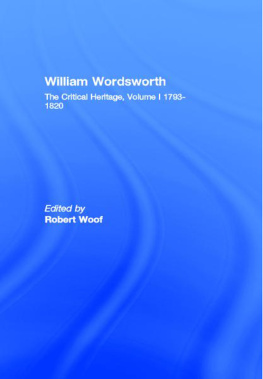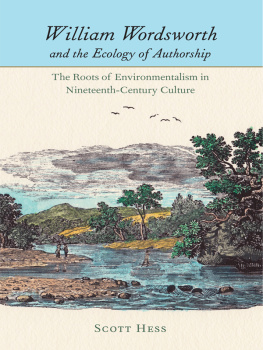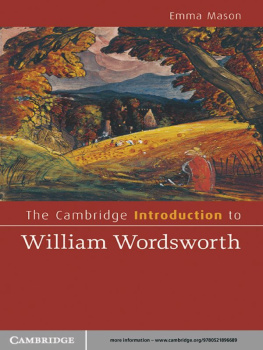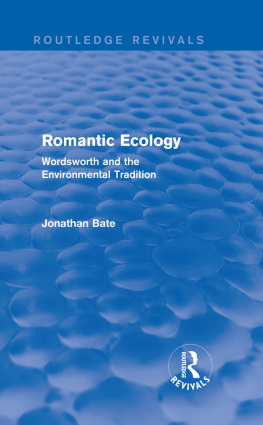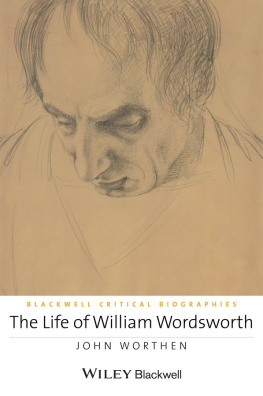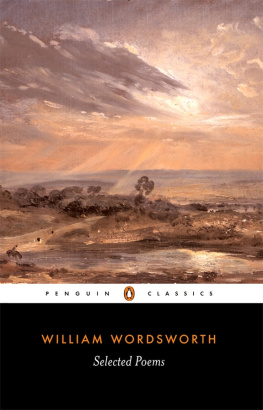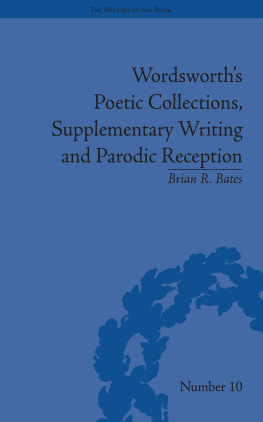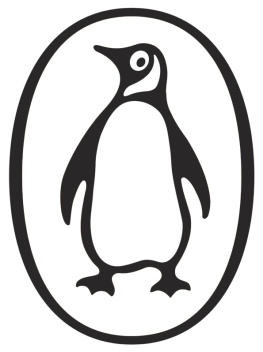Woof Robert - William Wordsworth
Here you can read online Woof Robert - William Wordsworth full text of the book (entire story) in english for free. Download pdf and epub, get meaning, cover and reviews about this ebook. City: London;New York, year: 2001, publisher: Routledge, genre: Detective and thriller. Description of the work, (preface) as well as reviews are available. Best literature library LitArk.com created for fans of good reading and offers a wide selection of genres:
Romance novel
Science fiction
Adventure
Detective
Science
History
Home and family
Prose
Art
Politics
Computer
Non-fiction
Religion
Business
Children
Humor
Choose a favorite category and find really read worthwhile books. Enjoy immersion in the world of imagination, feel the emotions of the characters or learn something new for yourself, make an fascinating discovery.
- Book:William Wordsworth
- Author:
- Publisher:Routledge
- Genre:
- Year:2001
- City:London;New York
- Rating:5 / 5
- Favourites:Add to favourites
- Your mark:
- 100
- 1
- 2
- 3
- 4
- 5
William Wordsworth: summary, description and annotation
We offer to read an annotation, description, summary or preface (depends on what the author of the book "William Wordsworth" wrote himself). If you haven't found the necessary information about the book — write in the comments, we will try to find it.
William Wordsworth — read online for free the complete book (whole text) full work
Below is the text of the book, divided by pages. System saving the place of the last page read, allows you to conveniently read the book "William Wordsworth" online for free, without having to search again every time where you left off. Put a bookmark, and you can go to the page where you finished reading at any time.
Font size:
Interval:
Bookmark:
Volume I 17931820
GENERAL EDITOR: B. C. SOUTHAM, M. A., B. LITT. (OXON)
Formerly Department of English, Westfield College, University of London
The Critical Heritage series collects together a large body of criticism on major figures in literature. Each volume presents the contemporary responses to a particular writer, enabling the student to follow the formation of critical attitudes to the writers work and its place within a literary tradition.
The carefully selected sources range from landmark essays in the history of criticism to fragments of contemporary opinion and little published documentary material, such as letters and diaries.
Significant pieces of criticism from later periods are also included in order to demonstrate fluctuations in reputation following the writers death.
For a list of volumes in the series, see the end of the book.
First published 2001
by Routledge
11 New Fetter Lane, London EC4P 4EE
Simultaneously published in the USA and Canada
by Routledge
29 West 35th Street, New York, NY 10001
Routledge is an imprint of the Taylor & Francis Group
This edition published in the Taylor & Francis e-Library, 2004.
Compilation, introduction, notes 2001 Robert Woof
All rights reserved. No part of this book may be reprinted or reproduced or utilised in any form or by any electronic, mechanical, or other means, now known or hereafter invented, including photocopying and recording, or in any information storage or retrieval system, without permission in writing from the publishers.
British Library Cataloguing in Publication Data
A catalogue record for this book is available from the British Library
Library of Congress Cataloging in Publication Data
William Wordsworth / [compiled by] Robert Woof.
p. cm. (Critical heritage series)
Includes bibliographical references and index.
1. Wordsworth, William, 17701850 Criticism and interpretation.
I. Woof, Robert. II. Series.
PR5888 .W44 2001
821.7 dc21 00045941
ISBN 0-203-16902-6 Master e-book ISBN
ISBN 0-203-26436-3 (Adobe eReader Format)
ISBN: 0415034418 (Print Edition)
The reception given to a writer by his contemporaries and near-contemporaries is evidence of considerable value to the student of literature. On the one side we learn a great deal about the state of criticism at large and in particular about the development of critical attitudes towards a single writer; at the same time, through private comments in letters, journals or marginalia, we gain an insight upon the tastes and literary thought of individual readers of the period. Evidence of this kind helps us to understand the writers historical situation, the nature of his immediate reading public, and his response to these pressures.
The separate volumes in the Critical Heritage series present a record of this early criticism. In each volume the documents are headed by an Introduction, discussing the material assembled and relating the early stages of the authors reception to what we have come to identify as the critical tradition. The volumes make available much material that would otherwise be difficult of access and present-day readers will be in a position to arrive at an informed understanding of the ways in which literature has been read and judged.
Dr Woofs first Wordsworth volume, running from the earliest reviews of 1793 to The River Duddon volume of 1820, treats a vast body of criticism, including journal reviews, satires, parodies and imitations, together with fugitive comments in private letters and journals, some of which material has not been seen in print before.
The strict chronological arrangement of the material, together with Dr Woofs illuminating Introduction and the extensive headnotes, provide us with an invaluable perspective on Wordsworths towering presence amongst his contemporaries and enable us to follow the stages of his poetic growth and change over the years.
BCS
CONVENTION OF CINTRA:
REVIEWS AND OPINIONS, 18091833
I would like to thank the many librarians over many years who have given me access to their collections, both of periodicals and of archives. The biggest debts are to the British Library and to the Wordsworth Library, but, as will be evident from the sources cited, private owners were always generous. I would like to acknowledge the assistance I received from the University of Newcastle upon Tyne and the Leverhulme Trust in making research possible over the years.
I would like to thank Sally Woodhead for her accurate and thoughtful typing of the text; Peter Regan for encouraging me to think that the book might be a finishable project; Alan Beale for translating and identifying foreign quotations; and my wife, Pamela, who, thirty years ago, thought the project an excellent idea. It is, and always was, her book.
Abbreviations have been kept to a minimum. Whenever possible, full references are given with each of the extracts.
Wordsworths texts are difficult to cite. There has been no complete edition of his poems since the work of Ernest de Selincourt and Helen Darbishire in the mid-twentieth century. The admirable Cornells Wordsworth, general editor Stephen Parrish, will be the basis of a future edition.
After the name of the poem, the reader is referred to the de Selincourt/Darbishire text. Because the revisions are particularly radical in Wordsworths early work, such as Lyrical Ballads, 1798 and 1800, and Poems 1807, additional references are given to those volumes.
| LB (1798) & LB (1800) | Lyrical Ballads: Wordsworth and Coleridge. The text of the 1798 edition with the additional 1800 poems and the Prefaces edited with introduction, notes and appendices, R. L. Brett and A. R. Jones (London, Methuen and Co. Ltd, 1963). |
| Poems 1807 | Wordsworth: Poems in Two Volumes, 1807, ed. Helen Darbishire (Oxford, Clarendon Press, 1914). |
| PW | The Poetical Works of William Wordsworth, ed. Ernest de Selincourt, volumes IV, 19409. Second edition (of Vols. IIII), ed. Helen Darbishire, 19524). |
| PW, I | Volume I, ed. Ernest de Selincourt, 1940, revised by Helen Darbishire, 1952. |
| PW, II | Volume II, ed. Ernest de Selincourt, 1944, revised by Helen Darbishire, 1952. |
| PW, III | Volume III, ed. Ernest de Selincourt, 1946, revised by Helen Darbishire, 1954. |
| PW, IV | Volume IV, ed. Ernest de Selincourt and Helen Darbishire, 1947. |
| PW, V | Volume V, ed. Ernest de Selincourt and Helen Darbishire, 1949. |
He strides on so far before you he dwindles in the distance.
This was Coleridges explanation for the failure of intelligent men, in this case his patron, Tom Wedgwood, and the Whig and one-time radical, James Mackintosh, to recognise Wordsworths power. It was Coleridge who enunciated the principle (one also shared by Wordsworth) which later defended Wordsworth from the attacks of his earliest critics: every great and original writer, in proportion as he is great or original, must create the taste by which he is to be relished; he must teach the art by which he is to be seen. Much of our understanding of Wordsworth springs from Coleridge, but, perhaps to a surprising extent, it depends also on what Wordsworth himself has told us about his art. His prefaces and essays, his letters, his dictated notes, records of his conversation, his sister Dorothys Journals, have all been potent in elucidating the nature of his poetry: of course, intentions are no substitute for great poetry, but if the poet is indeed as great as Wordsworth was, his insights about his own work cannot be ignored.
Font size:
Interval:
Bookmark:
Similar books «William Wordsworth»
Look at similar books to William Wordsworth. We have selected literature similar in name and meaning in the hope of providing readers with more options to find new, interesting, not yet read works.
Discussion, reviews of the book William Wordsworth and just readers' own opinions. Leave your comments, write what you think about the work, its meaning or the main characters. Specify what exactly you liked and what you didn't like, and why you think so.

